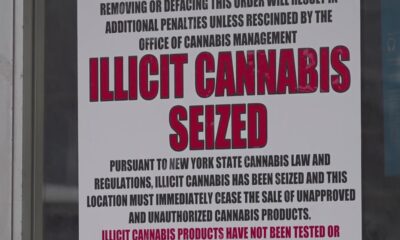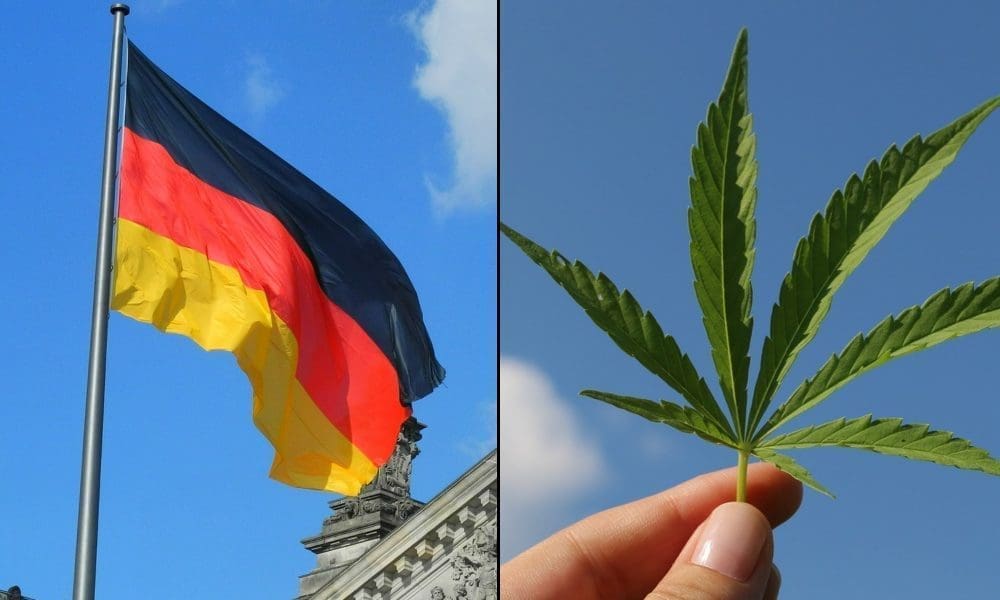featured
Oklahoma Marijuana Activists Plan Push To Put Legalization On Ballot Despite New Petioinining Restrictions
Published
1 day agoon

“We are proceeding forward and following the guidance provided by the secretary of state at the front end. This is basically extra administrative work for us.”
By Barbara Hoberock, Oklahoma Voice
Recreational marijuana supporters are moving forward with an effort to get it on the Oklahoma ballot, despite uncertainty about the constitutionality of a new law that slaps more regulations on the process.
Supporters of State Question 837 received permission to begin collecting signatures for a constitutional amendment that would legalize the use of recreational marijuana.
Supporters can begin collecting signatures August 6. The deadline to turn in the 172,993 signatures is November 3.
Lawmakers passed and Gov. Kevin Stitt (R) in May signed into law Senate Bill 1027 that puts more restrictions on the process voters use to get issues on the ballot.
It quickly drew two legal challenges in the Oklahoma Supreme Court.
The state’s high court has not blocked the law from taking effect because it wrote that it is considering a challenge to a State Question 836 to open the state’s primaries. The court order does not explain the reasoning.
Among other things, the new petition law puts caps on the number of signatures that can be collected by county, which supporters say forces greater participation outside the highest populated counties.
Jed Green is director of Oklahomans for Responsible Cannabis Action, a marijuana policy advocacy group backing legalization.
“We are proceeding forward and following the guidance provided by the secretary of state at the front end,” Green said. “This is basically extra administrative work for us. The more egregious unconstitutional aspects of 1027 may be litigated at some point in the future.”
The geographical requirements of the new law mean the organization has to collect signatures in 20 counties, which he is confident can be successfully done because his organization is statewide, he said.
“I think it is nearly impossible for anyone to be successful under the new rules,” said Amber England, who has worked on several ballot initiatives, including the successful effort to expand Medicaid and a current effort to raise the minimum wage to at least $15 an hour. The latter issue will be on the ballot in June 2026. While the state may have an initiative petition process on the books, because of the restrictions lawmakers have implemented, it effectively has been shut down, she said.
“I have worked on various different initiative petitions over the last decade,” she said. “The process has gotten harder every single time because of the different restrictions the Legislature has put on the process in an effort to take power away from voters.”
After lawmakers refused to act, voters used the process to expand Medicaid, pass criminal justice reform and legalize medical marijuana.
But voters have balked at legalizing recreational marijuana.
In 2018, 57 percent of voters approved legalizing medical marijuana.
But less than five years later, they defeated a proposed state statute change that would have legalized recreational marijuana. The vote was nearly 62 percent against State Question 820.
Pat McFerron, who ran the campaign against the recreational marijuana legalization, said it failed in all 77 counties.
“I think most Oklahomans believe the current system we have is de facto recreational,” he said. “The barrier is so miniscule so I see no desire among the public to make it even easier to buy cannabis.”

Author: mscannabiz.com
MScannaBIZ for all you Mississippi Cannabis News and Information.
You may like
-


Crackdown on illegal cannabis shops in Buffalo
-


Turkish Parliament Legalizes Low-THC Product Sales in Pharmacies
-


The DEA’s New Boss Holds the Keys to Weed Reform: Will He Take Action?
-


Former Erie Co. Home To Cannabis Growth Site?
-


New German Medical Cannabis Restrictions Will Harm Patients And Hinder Industry Growth (Op-Ed)
-


New Survey: 9 in 10 Americans Want Decontaminated Cannabis
featured
Turkish Parliament Legalizes Low-THC Product Sales in Pharmacies
Published
42 minutes agoon
July 24, 2025
The Turkish Parliament passed legislation on July 20 that will allow licensed pharmacies to sell low-THC products derived from hemp to medical patients with certain conditions.
Although Turkish media outlets referred to the reform as medical cannabis legalization, the new law focuses on expanding the country’s industrial hemp program from cultivation to a full supply chain that includes cannabinoid processing, distribution and sales of nonintoxicating products.
Regardless of whether it’s called cannabis or hemp, access to cannabinoid medicines will be expanding in Turkey, where lawmakers in 2016 approved legislation allowing only for sublingual sprays, like Sativex (nabiximols), a pharmaceutical that can alleviate neurological conditions.
Editor’s note: The 0.3% delta-9 THC threshold to differentiate hemp from cannabis in the U.S. dates back to the Agricultural Marketing Act of 1946; however, the threshold became more widely accepted globally after 1976, when Canadian taxonomist Ernest Small and American botanist Arthur Cronquist published an article in the journal Taxon entitled “A Practical and Natural Taxonomy for Cannabis,” even though they wrote that they “arbitrarily” adopted that concentration level.
RELATED: European Parliament Votes to Bring Hemp THC Level Back to 0.3%
Currently, Turkey permits licensed industrial hemp cultivation in 19 of its 81 provinces, but more regions are expected to adopt cultivation programs under the new law, the Hürriyet Daily News reported. Specifically, Turkey’s industrial hemp production grew from 280 tons in 2020 to more than 1,700 tons in 2024 following a call by President Recep Tayyip Erdoğan for farmers to ramp up the agricultural commodity.
“I am calling out to my nation; let’s start the process to cultivate industrial hemp,” Erdoğan said in early 2019. “We will see that industrial hemp has many different benefits in many different areas.”
Industrial hemp is primarily grown for fiber and grain, as hemp grown for cannabinoids, like THC and CBD, represents a separate market segment.
While Turkey’s Ministry of Agriculture and Forestry will continue to oversee hemp cultivation and harvesting under the country’s recently passed legislation, the Ministry of Health will have the authority to license and regulate hemp processing and pharmacy product sales to medical patients. Also, the Ministry of Health will govern a new electronic track-and-trace system to help ensure compliance and safety.
The Ministry of Health will also determine potential regulations around importing and exporting hemp, Turkish news site Haberler.com reported.
The new law amends Turkey’s “Health-Related Laws and Decree Law No. 663,” allowing for medical patients diagnosed with conditions ranging from chronic pain and epilepsy to cancer, multiple sclerosis, and certain psychological disorders, like post-traumatic stress disorder, to access the low-THC products.
While Turkey is primarily in West Asia, it joins many of its European neighbors, prominently Germany, in adopting more permissive cannabis laws.
RELATED: German Cannabis Market Establishes Foundation for Global Industry Expansion
Turkish Parliament Member Leyla Şahin said the new law aims to enhance Turkey’s competitiveness in a growing global sector, sparking potential economic growth through attracting international pharmaceutical companies, investors and research initiatives, the Hürriyet reported.
Those who violate provisions under Turkey’s new law will be fined twice the sales prices of all products subject to the violation, with increased penalties for subsequent offenses.
Historically, Turkey has had strict drug penalties, including up to five years in prison for possessing cannabis, while those who traffic illicit drugs can face 10-to-20-year sentences, according to the country’s penal code.

Author: mscannabiz.com
MScannaBIZ for all you Mississippi Cannabis News and Information.
featured
The DEA’s New Boss Holds the Keys to Weed Reform: Will He Take Action?
Published
2 hours agoon
July 24, 2025
After months of silence and bureaucratic stalling, the DEA finally has a new boss: Terrance Cole, confirmed by the Senate earlier this week.
That might not sound like major weed news since it’s the DEA and all, but it is. The federal effort to reschedule cannabis — perhaps the biggest shift in US drug policy in over half a century — now flows directly through him.
Let’s break it down: Cannabis is still a Schedule I substance under federal law, the same category as heroin and LSD, meaning the government officially considers it to have no medical value and a high potential for abuse. Yes, even in 2025, after nearly half of the U.S. states have legalized cannabis for adults to buy and consume.
Rescheduling to Schedule III, alongside Tylenol with codeine and anabolic steroids, wouldn’t legalize cannabis outright. But it would mark the biggest federal policy shift since the Nixon Administration launched the War on Drugs in 1970.
Cole told lawmakers prior to his confirmation that advancing the rescheduling process, initiated by the Biden Administration but since stalled under President Trump, is one of his top priorities.
That’s the good news.
The not-so-good? He has a long track record of anti-cannabis statements and refused to give direct answers about what outcome he wants for the process. He’s playing it close to the chest.
Then came a twist: Just one day after Cole’s confirmation, the DEA’s administrative law judge overseeing the rescheduling process, John Mulrooney, announced his retirement. In a letter, he said all matters now go straight to the DEA Administrator. That’s Cole.
The cannabis industry is cautiously spinning Cole’s appointment as a win. That’s mostly because it’s been starving for any federal progress. Hearings were supposed to begin in January but quickly got bogged down by procedural fights, witness disputes, and a general lack of urgency.
So now, he has two choices:
- Finalize the rescheduling recommendation and jam it through himself — unlikely, but possible.
- Appoint a new judge and restart hearings from scratch. That would mean more delays and more dysfunction. More on that below.
If rescheduling happens, the implications are massive, especially for cannabis businesses.
The biggest shift? Eliminating IRS Code 280E, a tax rule that bars cannabis operators from deducting normal expenses like payroll, rent, and office supplies. That rule has gutted balance sheets and pushed even profitable companies into the red.
Rescheduling could also unlock access to banking, ease mergers and acquisitions, and possibly even allow U.S. cannabis firms to list on major stock exchanges — though it’s unclear if Nasdaq or NYSE would permit that under Schedule III.
For social equity operators, it could be a lifeline. States like New York and Illinois established these licensing programs to give entrepreneurs harmed by the War on Drugs a first crack at the newly legal market. But the lack of federal reform and banking access has left many undercapitalized, buried in debt, and unable to open. New investment and lower capital costs could give them some breathing room.
But here’s the rub: Many grassroots advocates worry Schedule III could cement the dominance of deep-pocketed multistate operators like Curaleaf and Green Thumb Industries that cultivate and sell cannabis in multiple states. These companies already have the compliance teams, legal firepower, and capital to navigate federal ambiguity — and now, potentially, tax relief too.
Rescheduling doesn’t legalize cannabis. It doesn’t expunge records. And it technically wouldn’t stop federal agencies from hassling state-legal operators if they wanted to. It just makes the math easier — for the businesses that are already surviving.
Trump has political reasons to move on cannabis reform. He backed rescheduling during the campaign — meaning it would be a fulfilled campaign promise — and it could distract from Epstein file fallout and DOJ scandals. More importantly, he’s hemorrhaging Gen Z support, and they overwhelmingly back cannabis reform.
It also gives Trump a way to split the difference in his big-tent party. It’s not full legalization (which could trigger backlash from the religious Ron DeSantis/Mike Johnson wing), but it is a policy win that helps small American businesses, plays well with young voters, and looks like reform and a broadly popular issue without going all the way.
It’s a politically useful half-measure. But in this administration, it might be the best we get. Now that Judge Mulrooney’s out, the ball is squarely in Cole’s court.
Will he push it through? Or slow-walk it into oblivion? The industry’s watching. Closely.
Editor’s note: Check out more of Jeremy’s work over at Cultivated — one of our favorite sources for smart, nuanced cannabis coverage.
Photo by Thom Milkovic on Unsplash

Author: mscannabiz.com
MScannaBIZ for all you Mississippi Cannabis News and Information.
featured
New German Medical Cannabis Restrictions Will Harm Patients And Hinder Industry Growth (Op-Ed)
Published
3 hours agoon
July 24, 2025
“Despite significant and stable market growth, certain proposed policy changes that have been drafted may hinder industry progress and restrict patient access.”
By Niklas Kouparanis, Bloomwell Group
A new threat looms over the burgeoning medical cannabis market in Germany.
Recently, the German Health Ministry released a draft amendment that would require patients to have an in-person consultation annually and would bar prescriptions from being delivered by mail. While this is a draft and is likely to be changed during the legislative process, many are questioning the potential effects of policies like these on an otherwise growing and stable market.
Will this stall or even curtail future success?
Where the German medical cannabis market currently stands
Since the passage of the Cannabis Act (CanG) in April 2024, Germany has experienced significant growth in the country’s medical cannabis market due to cannabis being reclassified cannabis as a non-narcotic. This removed unnecessary administrative burdens on the medical cannabis market and allowed more patients to access the plant as a wellness treatment.
Prior to CanG being implemented last year, there were an estimated 200,000 to 300,000 medical cannabis patients in the German market. As of May 2025—just over one year after CanG went into effect—Whitney Economics estimates that there are now an additional 500,000 to 600,000 patients participating in the legalized self-paying market.
I predict that we could soon see a million patients if the market can grow under its current regulatory conditions.
As reported by the Federal Institute for Drugs and Medical Devices (BfArM), Germany imported over 37.223 metric tonnes of medical cannabis products in the first quarter of 2025. This number represents a noteworthy increase as the total imports for Q1 2025 increased by roughly 14.8 percent compared to the Q4 2024 total (32.419 metric tonnes). Compared to the same period a year prior, the Q1 2025 import numbers represent an increase of over 457 percent.
Proposed changes seek to put patient access at risk
Despite significant and stable market growth, certain proposed policy changes that have been drafted may hinder industry progress and restrict patient access.
In July 2025, the German Health Ministry released a draft amendment that would require patients to have an in-person consultation at a physician’s office or during a home visit once a year to be prescribed medical cannabis and also as a first step before starting their therapy.
In addition, medical cannabis treatments would no longer be able to be delivered by mail order. Patients would have to pick up their treatments at physical pharmacy locations.
Such legislative changes to current German cannabis law are led under the direction of Federal Health Minister Nina Warken, who is seeking to restrict patient access to medical cannabis. Warken has emphasized that record-high cannabis imports have increased beyond what was anticipated.
Report Reveals Digital Access Restrictions Would Push Patients to Illicit Market
According to German medical cannabis company Bloomwell Group’s latest report, “The Cannabis Barometer–Potential Consequences of Restricted Telemedicine Access,” which surveyed 2,500 medical cannabis patients in Germany, 41.7 percent of patients would revert to the illicit market if digital access were blocked.
Such findings suggest that digital access to licensed, physician-supervised cannabis therapy has successfully transitioned hundreds of thousands of patients away from unsafe, unregulated sources and into safe, pharmacy-distributed care.
Additionally, Bloomwell found that medical cannabis patient numbers show no signs of slowing down: In May and June 2025, the number of prescriptions filled on the company’s digital platform exceeded those from March 2024—the final month before medical cannabis was reclassified—by more than 1,100 percent, a new record high.
Other key findings from the Cannabis Barometer report included:
- Only 7 percent would consider joining one of Germany’s legal cannabis clubs, which mainly serve recreational users.
- Seventy-nine percent of patients previously relied on unlicensed sources (illegal market and/or through friends and acquaintances) before accessing digital therapy.
- Forty-seven and a half percent now say cannabis obtained from pharmacies is less expensive than unlicensed products, debunking myths about affordability. Only 13.8 percent responded that pharmacy cannabis is more expensive.
- Eighty-three percent believe medical cannabis from pharmacies is of higher quality than illicit alternatives.
Public and safety benefits of digital access
As mentioned, the passage of CanG allowed for further patient access to the legalized medical cannabis system. Such access prompted some individuals to shift from the illicit market to the regulated medical system, as they could now access prescribing physicians and treatments through digital platforms—signaling a significant harm reduction and an overall win for major public health.
Restricting digital access not only reverses this trend but also reintroduces substantial risks associated with unlicensed products, such as contamination, mislabeling and improper packaging that isn’t child-resistant.
Overlooked by critics of the legalized telemedical cannabis industry is that digital consultations for patients still involve licensed prescribing physicians, helping to ensure proper oversight and usage. Removing this channel simply undermines patient access without any apparent benefit.
Access equality for disabled and rural populations
Medical cannabis treatment is often prescribed to patients experiencing conditions that can vary in severity and may limit their mobility. Patients with chronic conditions, immunocompromised and disabilities can find it extremely difficult to travel to physicians’ offices for in-person consultations. The same issue applies to Germans living in rural areas.
These patients depend on digital consultations and mail-in orders to treat their medical conditions. Also, since there are a limited number of doctors in Germany who prescribe medical cannabis, many of these patients may be left without access and may have to turn to the illicit market.
Economic impact of restriction of access
The proposed policy changes not only pose harm to patients but also hinder the market’s growth. The German medical cannabis industry has demonstrated significant and stable development, generating job opportunities, tax revenue and investment opportunities. Regressive policies could slow or upend progress.
As mentioned in the Cannabis Barometer report, 41.7 percent of German medical cannabis patients stated that they would seek cannabis through illicit sources if their digital access were restricted. If that is the case, a large portion of economic activity would shift from regulated, taxable sales to the illicit market.
While we continue to consider these points, it’s important to remember that we are still at the beginning of the policy process and are hopeful that these changes are unlikely to be implemented. The German market will continue to thrive.
Niklas Kouparanis is CEO and co-founder of Bloomwell Group. Since 2017, he’s been a serial entrepreneur, medical cannabis pioneer, founder and growth activator of companies, all while shaping the future of the European cannabis industry.

Author: mscannabiz.com
MScannaBIZ for all you Mississippi Cannabis News and Information.

Crackdown on illegal cannabis shops in Buffalo

Turkish Parliament Legalizes Low-THC Product Sales in Pharmacies

The DEA’s New Boss Holds the Keys to Weed Reform: Will He Take Action?

Former Erie Co. Home To Cannabis Growth Site?

New German Medical Cannabis Restrictions Will Harm Patients And Hinder Industry Growth (Op-Ed)

New Survey: 9 in 10 Americans Want Decontaminated Cannabis
Dream Of Working In Weed? This Scholarship Could Make It Happen

Cresco Labs Exiting California Market as Part of ‘Strategic Restructuring’

What to know about growing cannabis in your home

Marijuana Would Be Legalized In Texas Under New Bill Filed For Special Legislative Session

Drug bust finds pounds of cocaine, cannabis at NY residence: Chautauqua Co. Sheriff’s Office

How Alcohol And Cannabis Affect Gut Health

Inside a huge High Street cannabis farm in Huntingdon

LEEF Brands Announces CAD $1 Million Private Placement

One Dose. Two Years. Psilocybin Can Ease Depression In Cancer Patients, New Research Shows

Mississippi AG takes aim at hemp products, including Delta THC | News

Missouri Supreme Court Rules Counties Cannot ‘Stack’ Cannabis Sales Taxes

Mississippi AG takes aim at hemp products, including Delta THC | TN State News

Oregon Officials Issue Ballot Title For Initiative To Legalize Marijuana Social Lounges

Limiting marijuana use in public | FOX 5 New York

From The Vault: HARVEST HIGHS (1986)

California Bill Would Let ‘Small’ Cannabis Producers Ship Directly to Consumers

DEA Promotes Guide To ‘Decode’ Drug Emojis, Saying The Shocked Face Represents Marijuana 😮

Mississippi AG takes aim at hemp products, including Delta THC | State

Alert: Department of Cannabis Control updates data dashboards with full data for 2023

Connecticut Appoints The US’s First Cannabis Ombudsperson – Yes there is a pun in there and I’m Sure Erin Kirk Is Going To Hear It More Than Once!

5 best CBD creams of 2024 by Leafly

EU initiative begins bid to open access to psychedelic therapies

Free delta-9 gummies from Bay Smokes
New Study Analyzes the Effects of THCV, CBD on Weight Loss

5 best autoflower seed banks of 2024 by Leafly

May 2024 Leafly HighLight: Pink Runtz strain

Curaleaf Start Process Of Getting Their Claws Into The UK’s National Health System – With Former MP (Resigned Today 30/5/24) As The Front Man

Mississippi city official pleads guilty to selling fake CBD products

Discover New York’s dankest cannabis brands [September 2024]

Horn Lake denies cannabis dispensary request to allow sale of drug paraphernalia and Sunday sales | News

Press Release: CANNRA Calls for Farm Bill to Clarify Existing State Authority to Regulate Hemp Products

Local medical cannabis dispensary reacts to MSDH pulling Rapid Analytics License – WLBT

Nevada CCB to Accept Applications for Cannabis Establishments in White Pine County – “Only one cultivation and one production license will be awarded in White Pine County”

5 best THC drinks of 2024 by Leafly

6 best CBD gummies of 2024 by Leafly

The Daily Hit: October 2, 2024

5 best delta-9 THC gummies of 2024 by Leafly

Weekly Update: Monday, May 13, 2024 including, New Guide for Renewals & May Board meeting application deadline

People In This State Googled ‘Medical Marijuana’ The Most, Study Shows

PRESS RELEASE : Justice Department Submits Proposed Regulation to Reschedule Marijuana

Thailand: Pro-cannabis advocates rally ahead of the government’s plan to recriminalize the plant

Press Release: May 9, STIIIZY and Healing Urban Barrios hosted an Expungement Clinic & Second Chance Resource Fair
Trending
-

 California Cannabis Updates1 year ago
California Cannabis Updates1 year agoAlert: Department of Cannabis Control updates data dashboards with full data for 2023
-

 Breaking News1 year ago
Breaking News1 year agoConnecticut Appoints The US’s First Cannabis Ombudsperson – Yes there is a pun in there and I’m Sure Erin Kirk Is Going To Hear It More Than Once!
-

 best list12 months ago
best list12 months ago5 best CBD creams of 2024 by Leafly
-

 Business10 months ago
Business10 months agoEU initiative begins bid to open access to psychedelic therapies
-

 Bay Smokes1 year ago
Bay Smokes1 year agoFree delta-9 gummies from Bay Smokes
-

 cbd1 year ago
cbd1 year agoNew Study Analyzes the Effects of THCV, CBD on Weight Loss
-

 autoflower seeds10 months ago
autoflower seeds10 months ago5 best autoflower seed banks of 2024 by Leafly
-

 California1 year ago
California1 year agoMay 2024 Leafly HighLight: Pink Runtz strain




